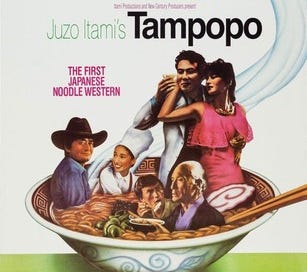Film: Tampopo (1985)
Written and Directed by: Juzo Itami
Starring: Ken Watanabe, Tsutomu Yamazaki, Nobuko Miyamoto
Dear Race Car Fans and Entrepreneurs and People Who Eat at Restaurants,
Don’t you just love cowboy hats? I wonder if someone can accomplish anything while wearing a cowboy hat.
Seriously. Let’s think about this. If you walked into a room without a cowboy hat, and you wanted some breakfast—say, pancakes—and you asked for pancakes, would someone just give you pancakes because you asked? (Maybe? Probably? Perhaps?)
Now, if you walked into a room and you were wearing a cowboy hat, you’d talk a little differently, probably. And when you said, “Dear, can you fix me up a nice plate of pancakes with that lovely blueberry sauce you like to put all over it?”
The cute guy waiting on you in the restaurant is going to touch his chest and say to himself, “That person just called me dear.” And then that cute guy is going to say, “Coming right up.”
That is how we need to walk through this world, don’t you think? Wearing visible or invisible cowboy hats. Assuming that what we ask for will just show up. Now, it’s possible that the cook in the kitchen is out back smoking a cigarette, and the pancakes take a little longer than expected to arrive in front of us. Or the waiter gets held up talking to a few guests in the corner, because someone knows someone who met Michelle at a party, and then there was this baby shower and he needs to look at the pictures of the cute baby at the baby shower, and then he’s going to make his way to the computer and put in the pancakes order.
Sometimes, maybe it gets a little hot in that cowboy hat, and your forehead sweats, but that just adds to the joy of it—and you should never take off the cowboy hat just because you’re sweating a little. You take off a cowboy hat only when the job is done, when the pancakes have arrived, when everyone in the room is satisfied, and things are in a place of peace. Then you make your way out of the room, you walk—no, you strut—to your car or the train or the plane (whatever method of transportation transports you), and you get home and get some rest. That is how life works when you wear the cowboy hat. It’s a grand affair. Every day. Grand.
What does all this have to do with the Japanese film Tampopo, from 1985, written and directed by Juzo Itami?
The character in the cowboy hat, whose name is Gun (played by Ken Watanabe), gets a lot done. He not only shows people respect, but he speaks up when someone is being treated poorly, and he teaches a woman how to make better Ramen noodles, and even trains her physically to be a skilled business owner. He looks off into the distance, pondering. Sometimes, he’ll share a little bit about his life. His eyes get wistful. And then he returns to the task at hand like the badass he is. He wields respect and receives a lot of appreciation, and he doesn’t take advantage of anyone.
The character in the white fedora and the white suit in Tampopo (played by Koji Yakusho), conversely…. Well, he’s interesting-ish. He takes what he wants, he says what he wants, and he gets hurt a lot. He doesn’t come to a good end. He’s too focused on himself. He wants to teach everyone a lesson, and be seen, and indulge in pleasure. And while this is fun for him, for a time, it doesn’t help him get out of troubled waters. It just keeps putting him in places he can’t swim.
Life is full of metaphors. Duh! And what we see externally is usually what we are, or who we know, or whatever framework we’ve adopted in our own minds, hearts, and beings.
One could be living in a valley and yet feel inside, that he or she is floating on a river.
One could be floating on a river and feel that he or she is in front of a warm fire in a mountain home.
People put so much stock in their surroundings, and what other people say and do, that they forget to tap in and create the reality that is a truer reality, from within.
The filmmaker of Tampopo, Juzo Itami, didn’t become a renowned filmmaker because he did things the way other people do things. He tapped to a place inside himself that is wild and unique. He blended genres, took risks, created art that calls and beckons to its viewer to pay attention—not only here, while watching a film, but everywhere. Live, this film says. Live.
Live.
Don’t you forget it!
Cheerfully,
Ms. Wonderful
This Saturday Vinyl Playlist is one album only
(No cowboy hats? Those guys are in for a world of trouble, I reckon!)






